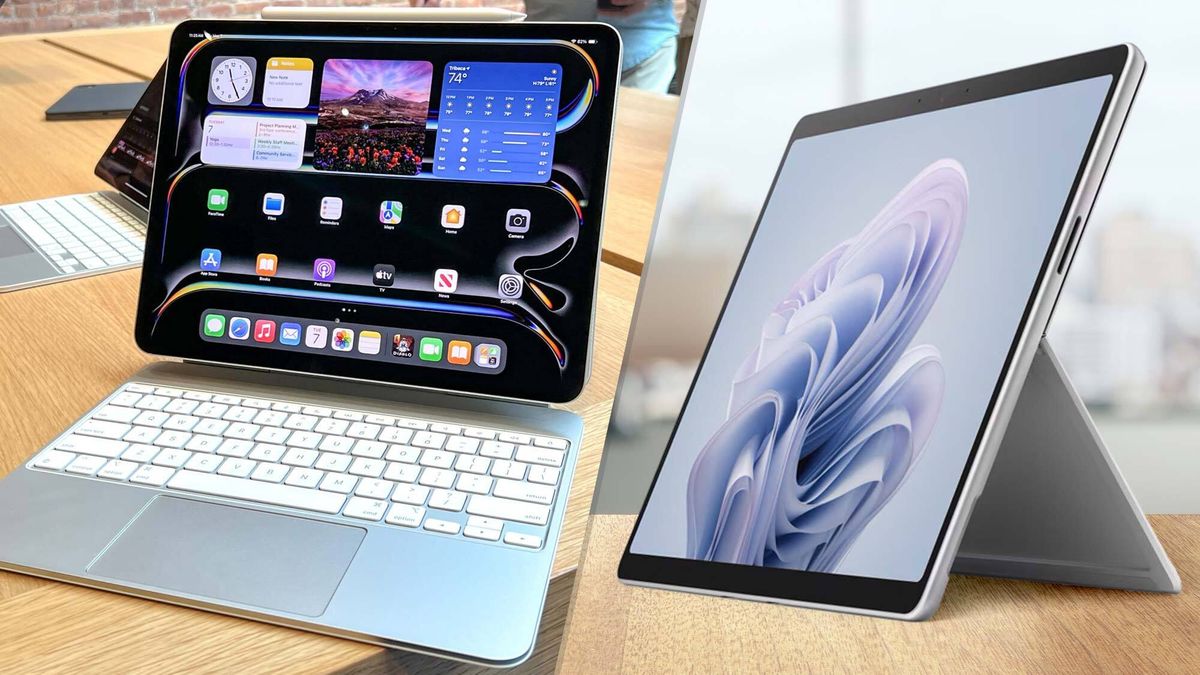There’s a lot to consider when trying to decide between buying the new iPad Pro 2024 vs Microsoft Surface Pro 10, the latest flagship tablets from Apple and Microsoft.
With its fancy new OLED display, speedy M4 chip and $999 starting price the iPad Pro 2024 appears to deliver a lot of value for a premium tablet. But the Microsoft Surface Pro 10 ($1,199 to start) looks to be more capable and easier to work on, as it comes with a built-in kickstand and all the versatility of Windows 11.
But don’t count Apple out of the productivity conversation—some of us here at Tom’s Guide feel the iPad Pro 2024 could be a legitimate laptop replacement when kitted out with a proper detachable keyboard, something you can buy for either tablet.
I’ll show you exactly how these two premium tablets stack up against each other in this iPad Pro 2024 vs Microsoft Surface Pro 10 breakdown.
iPad Pro 2024 vs Microsoft Surface Pro 10: Price and specs
| Row 0 – Cell 0 | iPad Pro 2024 (11″/13″) | Surface Pro 10 for Business |
| Price | from $999/$1,299 | from $1,199 |
| Display | 11-inch/13-inch 120Hz Tandem OLED (2420 x 1668 pixels)/(2752 x 2064 pixels) | 13-inch (2880 x 1920) 120Hz |
| Colors | Silver, Space Black | Platinum, Black |
| Chip | M4 | Intel Core Ultra 5 135U/Intel Core Ultra 7 165U |
| Storage | 256GB, 512GB, 1TB, 2TB | 256GB, 512GB, 1TB |
| Cameras | 12MP front landscape, 12MP rear | 1440p ultrawide front-facing camera, 10.5MP rear camera |
| Wireless | Wi-Fi 6E, Bluetooth 5.3, 5G | Wi-Fi 6E, Bluetooth 5.3 |
| Size | 9.83 x 6.99 x 0.21 inches / 11.09 x 8.48 x 0.2 inches | 11.3 x 8.2 x 0.37 inches |
| Weight | 0.98 pounds / 1.28 pounds | 1.94 pounds |
As you can see from the specs chart above, Microsoft’s Surface Pro 10 for Business is bigger, heavier and thicker than either size of Apple’s iPad Pro 2024, though the differences narrow considerably when compared against the 13-inch iPad Pro 2024.
Apple’s 13-inch tablet also starts $100 more expensive than Microsoft’s, though the price of both slates can rise precipitously once you start upgrading the internals.
iPad Pro 2024 vs Microsoft Surface Pro 10: Design
Apple’s iPad Pro 2024 comes in two sizes (11-inch or 13-inch) and sports all the hallmarks of the modern iPad design: Rounded corners, a thin bezel between screen and edge, a good front-facing camera mounted on the long side and a rear-facing camera array mounted on the back corner.
It’s a well-made tablet that feels good in the hands, according to my colleague Tony Polanco’s iPad Pro 2024 review. Apple actually managed to make the 2024 Pro significantly slimmer than its predecessors, so it’s slightly thinner than a modern iPad Air 2024 now.
If that matters to you, you’ll definitely feel a difference between Apple’s 0.2-inch thin slate and Microsoft’s 0.37-inch tablet, though the difference shouldn’t actually affect how you use these devices or how comfortable they are to hold.
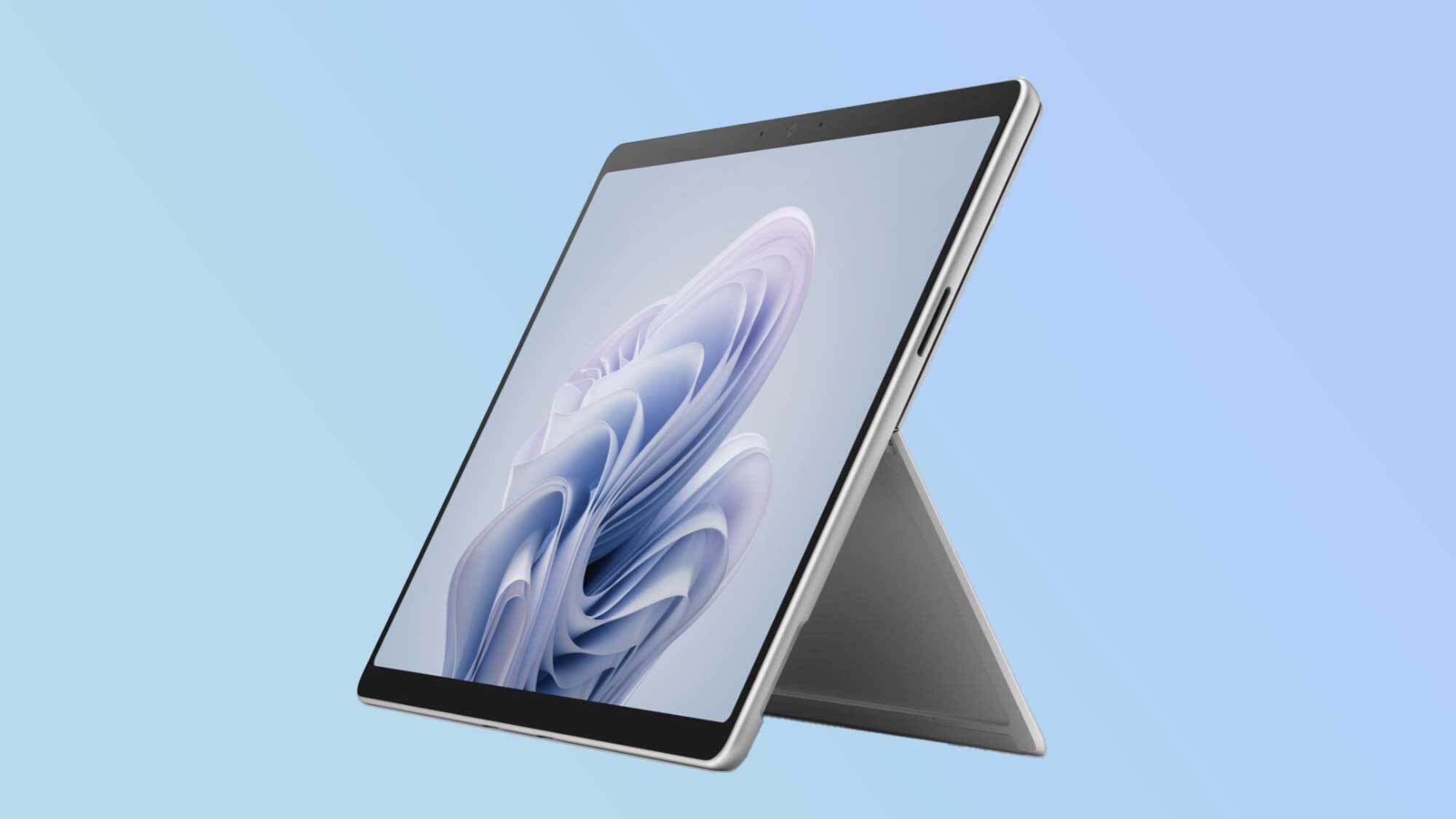
The Surface Pro 10 looks quite similar to the iPad, with similarly thin bezels and rounded corners gracing a rectangular frame that weighs nearly two pounds.
The Surface Pro 10 does weigh up to a pound more than the iPad Pro 2024, depending on which models you’re comparing, but that makes sense when you consider that Microsoft’s tablet is designed to be more upgradable and repairable than the iPad. Microsoft sells replacement parts and tools (on both its website and through iFixit) that you can use to replace, repair or in some cases even upgrade components like the SSD, battery, motherboard and more.
Not only that, but the Surface Pro 10 has a little kickstand built in that likely adds a bit of heft to the device, but could come in handy when using it on an airplane or at a desk.
iPad Pro 2024 vs Microsoft Surface Pro 10: Display
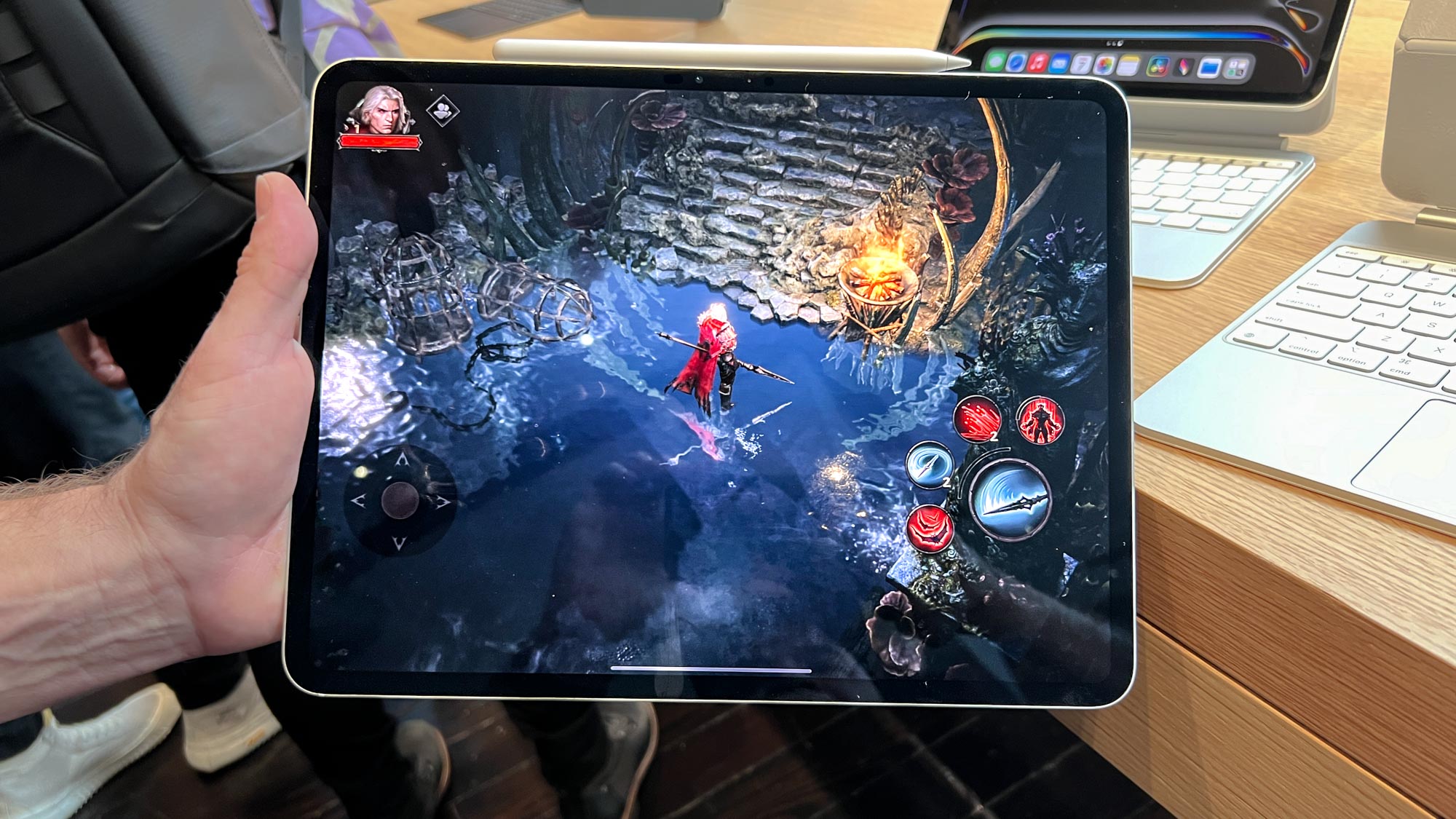
The iPad Pro 2024 is the first iPad to ship with an OLED display, and in person it looks quite lovely. Apple actually calls it a Tandem OLED display since the company claims there are two layers of OLED pixels that combine to make one display capable of achieving up to 1,000 nits of peak brightness, or up to 1,600 nits when viewing HDR content. It also supports a variety of HDR formats, including Dolby Vision and HDR10.
The iPad Pro 2024 displays also offer a 120Hz ProMotion refresh rate, which can make scrolling feel smother than on a standard 60Hz display. And while the resolution (and thus number of pixels) you get changes based on the size of the iPad Pro you buy (2420 x 1668 pixels for the 11-inch, 2752 x 2064 pixels for the 13-inch), the iPad Pro 2024 offers a pretty good PPI (pixels per inch) of 264-267.
If you’re worried about glare, you can shell out an additional $100 on the expensive (1TB or bigger) iPad Pro 2024 models to get them with nano-texture glass, which Apple claims can reduce glare and reflections on the OLED display.
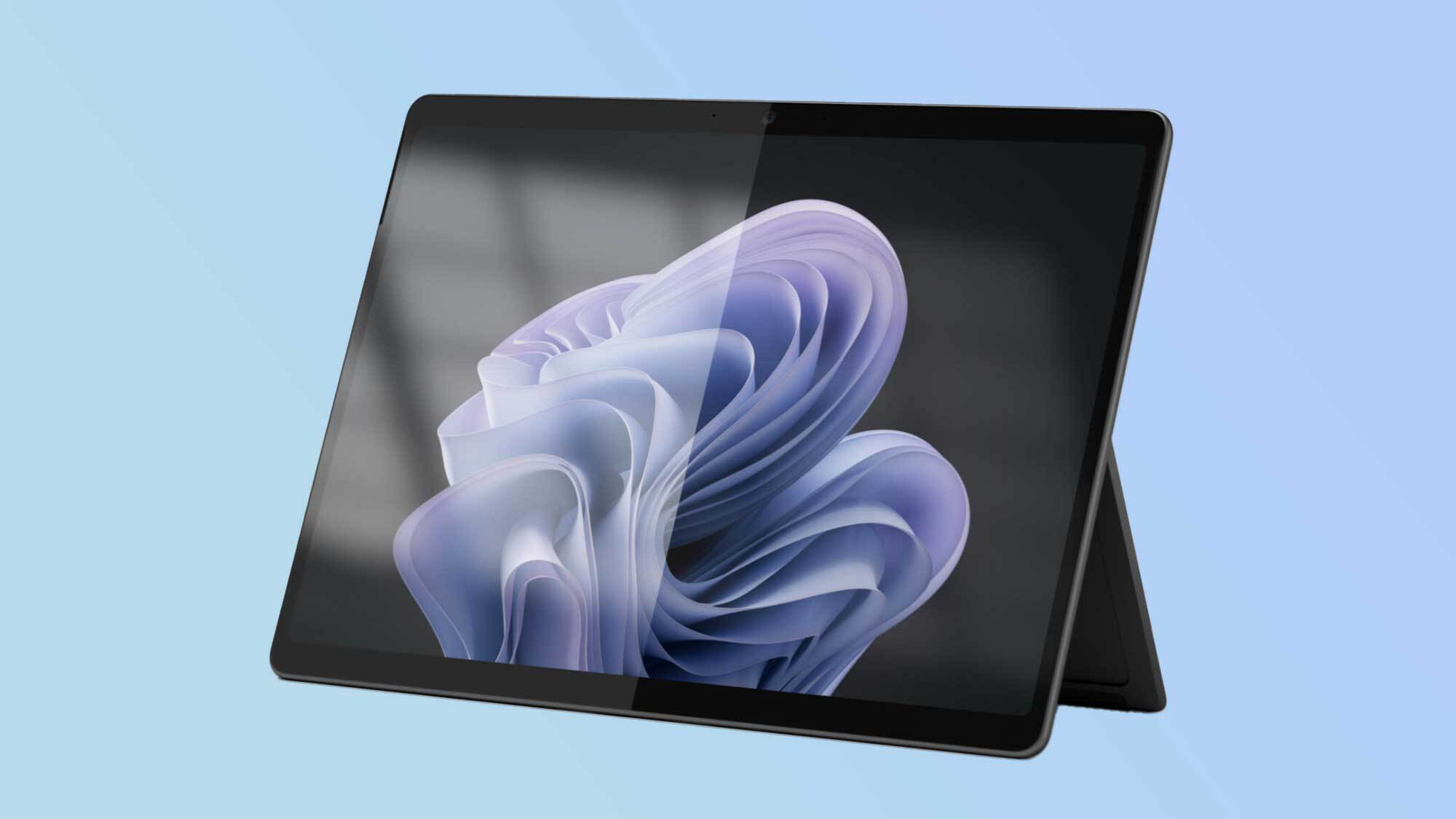
The Microsoft Surface Pro 10, by comparison, features a 13-inch “PixelSense Flow” touch display with a resolution of 2,880 x 1,920 pixels, a 3:2 aspect ratio and a 120Hz refresh rate. The display also has anti-reflective technology built in, and it offers support for Dolby Vision IQ.
In fact, the Surface Pro 10 for Business actually meets or beats the iPad Pro 2024 in terms of resolution since its nearly 3K display delivers roughly 267 PPI (pixels per inch). However, it’s not an OLED display, and that alone could be a game-changer for some people which could lead them to buy an iPad Pro 2024 instead.
iPad Pro 2024 vs Microsoft Surface Pro 10: Performance
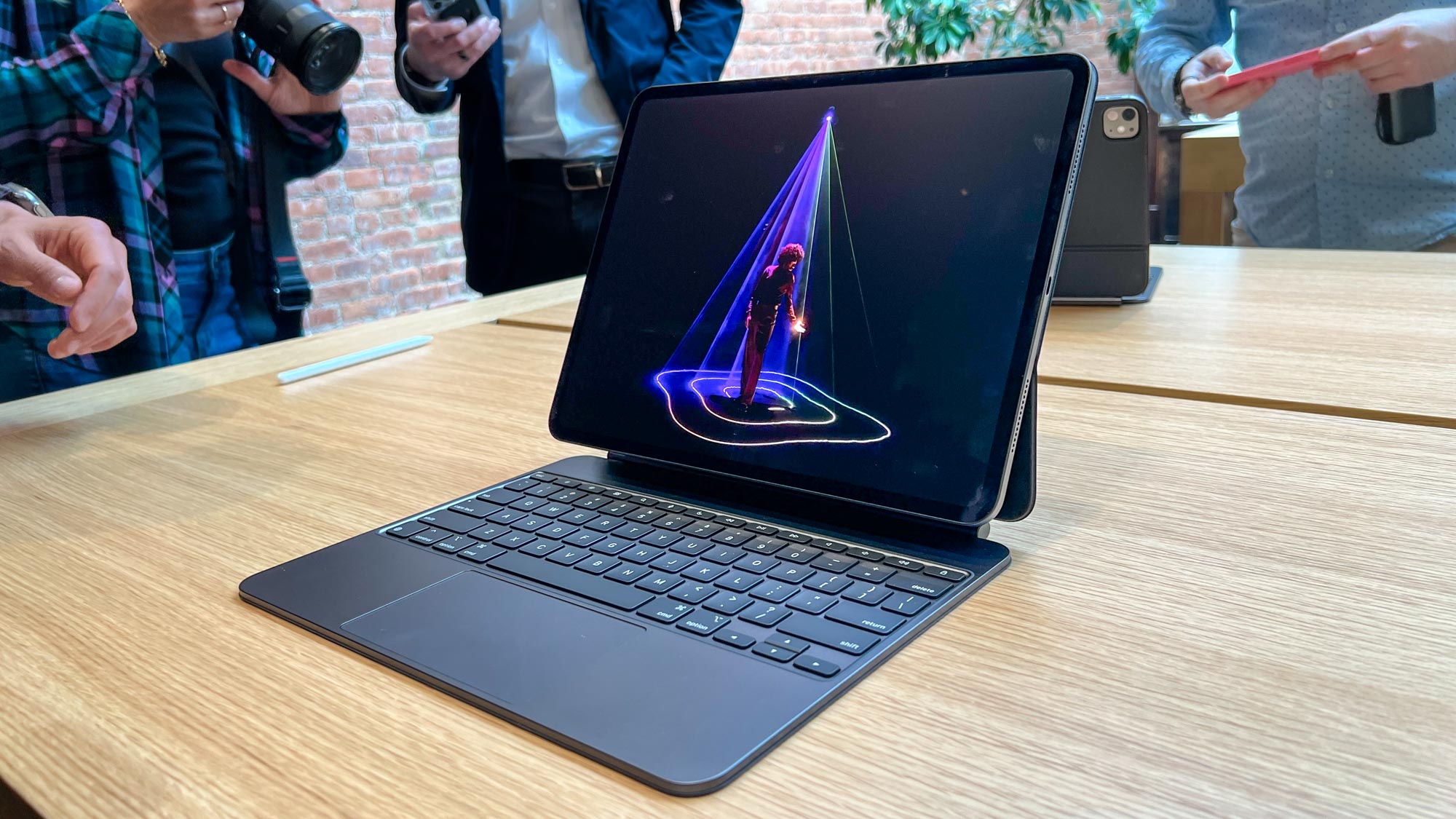
The performance of the iPad Pro 2024 should be pretty good given it’s the first device to arrive sporting an Apple M4 chip. This latest slice of Apple silicon is only available in this iPad (for now), though to get the best version of M4 you have to shell out for a pricier iPad Pro 2024 with 1TB of storage or more.
These higher-end iPad Pro 2024s come with 16GB of RAM and an M4 chip with a 10-core GPU and a 10-core CPU. The cheaper models with less than 1TB of storage come with just 8GB of RAM and a weaker M4 chip that has a 9-core GPU, which means the entry-level iPad Pro 2024 will likely feel slower and perform slightly worse than the more expensive models.
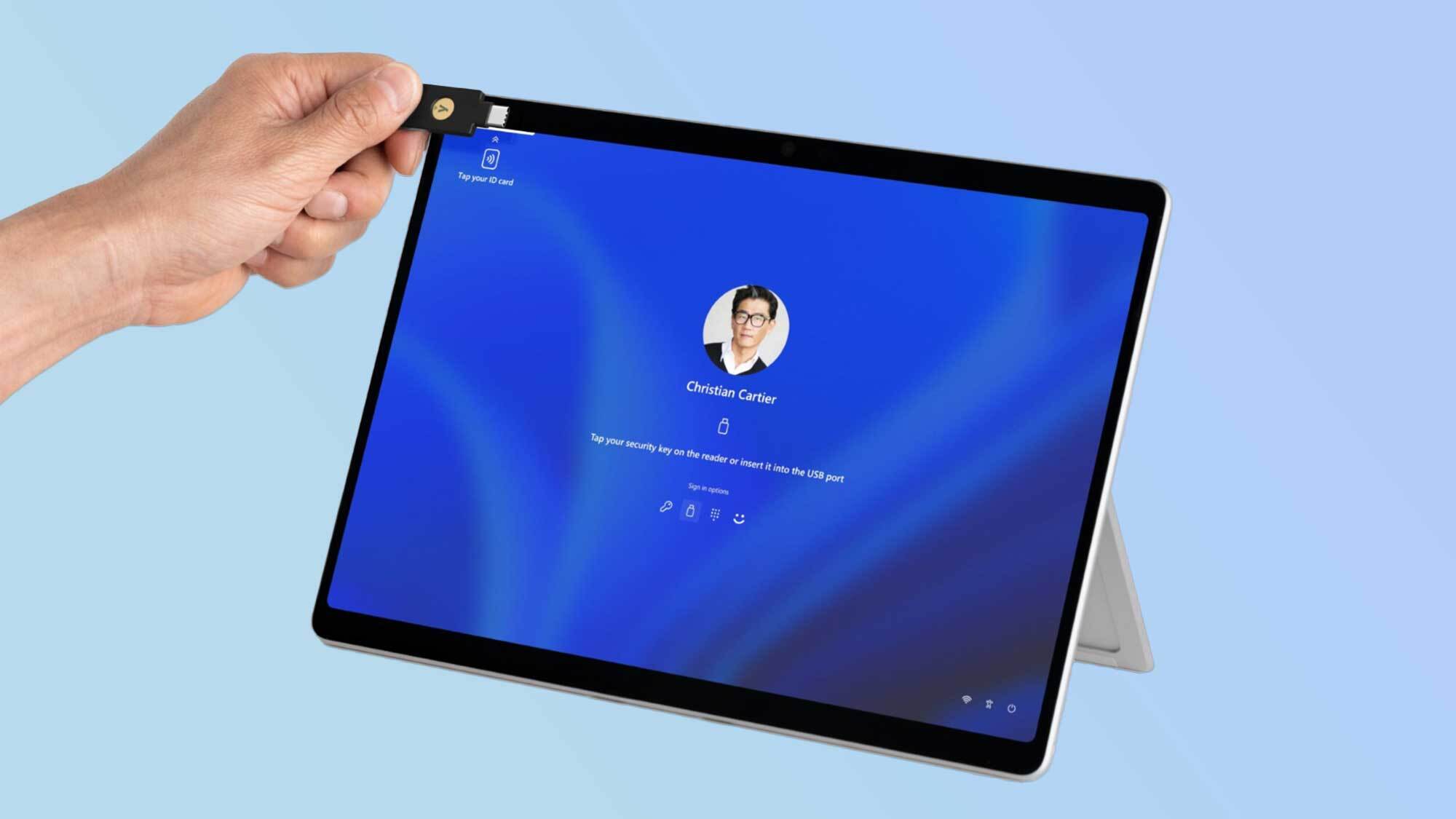
Microsoft’s Surface Pro 10 for Business, by comparison, can be configured with more RAM than the iPad Pro 2024 (up to 64GB) and ships with some of the new Intel Meteor Lake chips inside.
These are the first Intel CPUs to come with an NPU (Neural Processing Unit) built in, and while they may be fast and power-efficient it’s unlikely either model of Surface Pro 10 for Business currently available (you can get one with either an Intel Core Ultra 5 135U or an Intel Core Ultra 7 165U CPU inside) will be able to outrun or outlast the M4 chip.
That’s based purely on the performance of prior Intel CPUs and prior Apple M chips in iPads, since we have yet to fully test either the iPad Pro 2024 or the Microsoft Surface Pro 10. Once we have a chance to test both, we’ll update this article with more specific details about how their performance compares.
Another key detail to keep in mind is that we’ve only met the Surface Pro 10 for Business. Microsoft is rumored to be preparing a Microsoft Surface Laptop 6 and Surface Pro 10 packing Qualcomm’s Snapdragon X Elite CPU, which could launch as soon as mid-May. If that proves true, the Surface Pro 10 with Snapdragon is a wild card we need to get in for testing to see if it can really rival the performance of Apple’s M4.
iPad Pro 2024 vs Microsoft Surface Pro 10: Audio
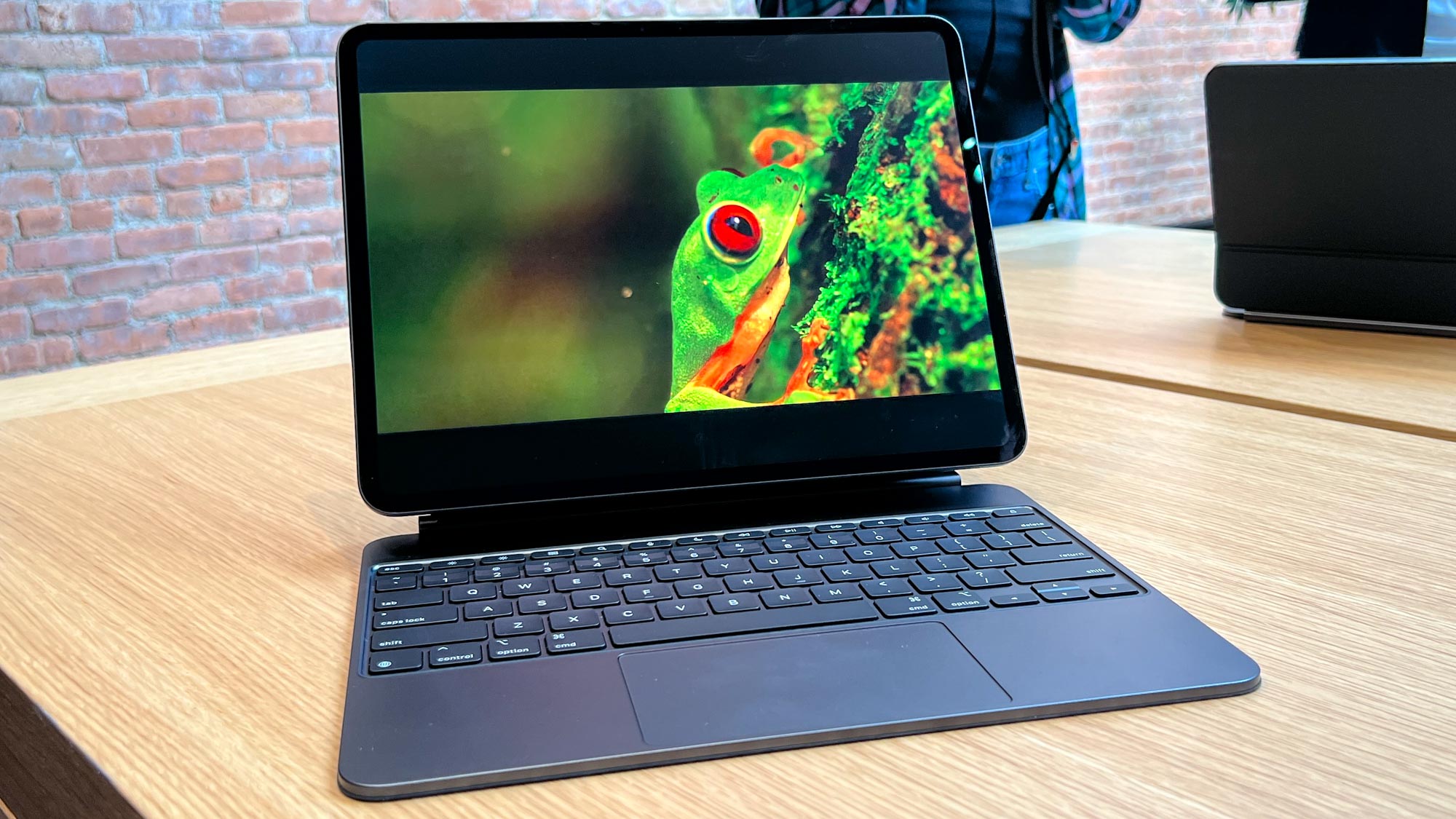
The iPad Pro 2024 delivers pretty good sound quality thanks to the four speakers built into the device, as well as its support for Dolby Atmos. We haven’t yet had a chance to truly put the tablet’s sonics to the test at home, but based on our hands-on experience it sounds pretty good to us. Plus, four speakers is a rare find in tablets at any price.
The iPad Pro 2024 also has four microphones built in, which is why Apple tries to pitch it as not just a great device for making calls, but recording podcasts, music tracks and more. Your mileage may vary, but the fact is I’ve never seen a tablet with this many microphones inside.
The Microsoft Surface Pro 10 offers just a pair of studio mics and a pair of stereo speakers inside, half what you get with the iPad Pro 2024. They should still be more than serviceable though, as the speakers support Dolby Atmos.
iPad Pro 2024 vs Microsoft Surface Pro 10: Cameras

The iPad Pro 2024 sports basically the same cameras as its predecessor, which were pretty good as tablet cameras go.
In addition to a 12MP ultra wide front camera on the front and another 12MP rear camera, the iPad Pro 2024 also has a TrueDepth camera which allows it to support FaceID (aka logging in with your face). The rear camera can also record video in up to 4K or ProRes resolution, which could be a big deal for video professionals and prosumers.
Microsoft’s Surface Pro 10 has a different camera complement that can do basically all the same things. The front-facing 1440p ultra wide camera has an IR sensor that lets you log in with your face (if you want) via Windows Hello, and Windows 11’s Windows Studio Effects software enhancements let you enable things like automatic framing and background blur during video calls.
On the back of the Surface Pro 10 you get a 10.5MP camera, which looks to deliver slightly lower resolution than the 12MP camera on the back of the iPad Pro 2024. This minor difference could be significant if you’re the kind of person who shoots photos or video with your tablet, but most folks likely won’t notice.
iPad Pro 2024 vs Microsoft Surface Pro 10: Accessories
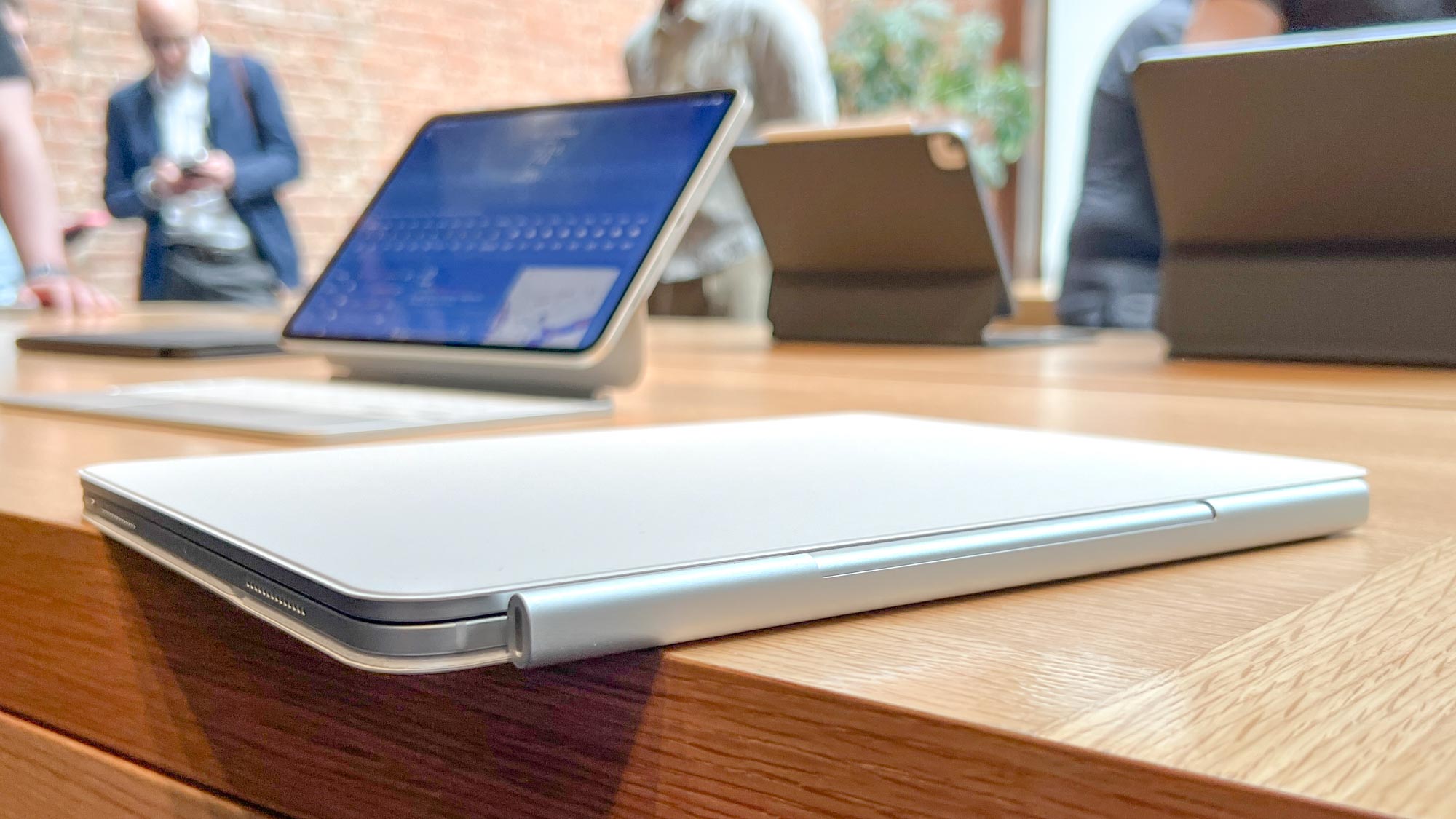
Both the iPad Pro 2024 and Surface Pro 10 are tablets that can be enhanced with a detachable keyboard and stylus for an additional cost.
As far as writing and doodling implements go, the iPad Pro 2024 supports both the $79 Apple Pencil (USB-C) and the Apple Pencil Pro ($129). Plus, Apple is selling it alongside a new Magic Keyboard for iPad Pro ($299/$349 for 11-inch/13-inch) specifically designed for these new tablets.
This new Magic Keyboard for iPad Pro has 4 key improvements, including a larger glass trackpad than the existing Magic Keyboard, a new aluminum palm rest and a new row of function keys that make it a bit more like a laptop. We haven’t had a chance to use one ourselves extensively yet, but it looks like a premium tablet keyboard.
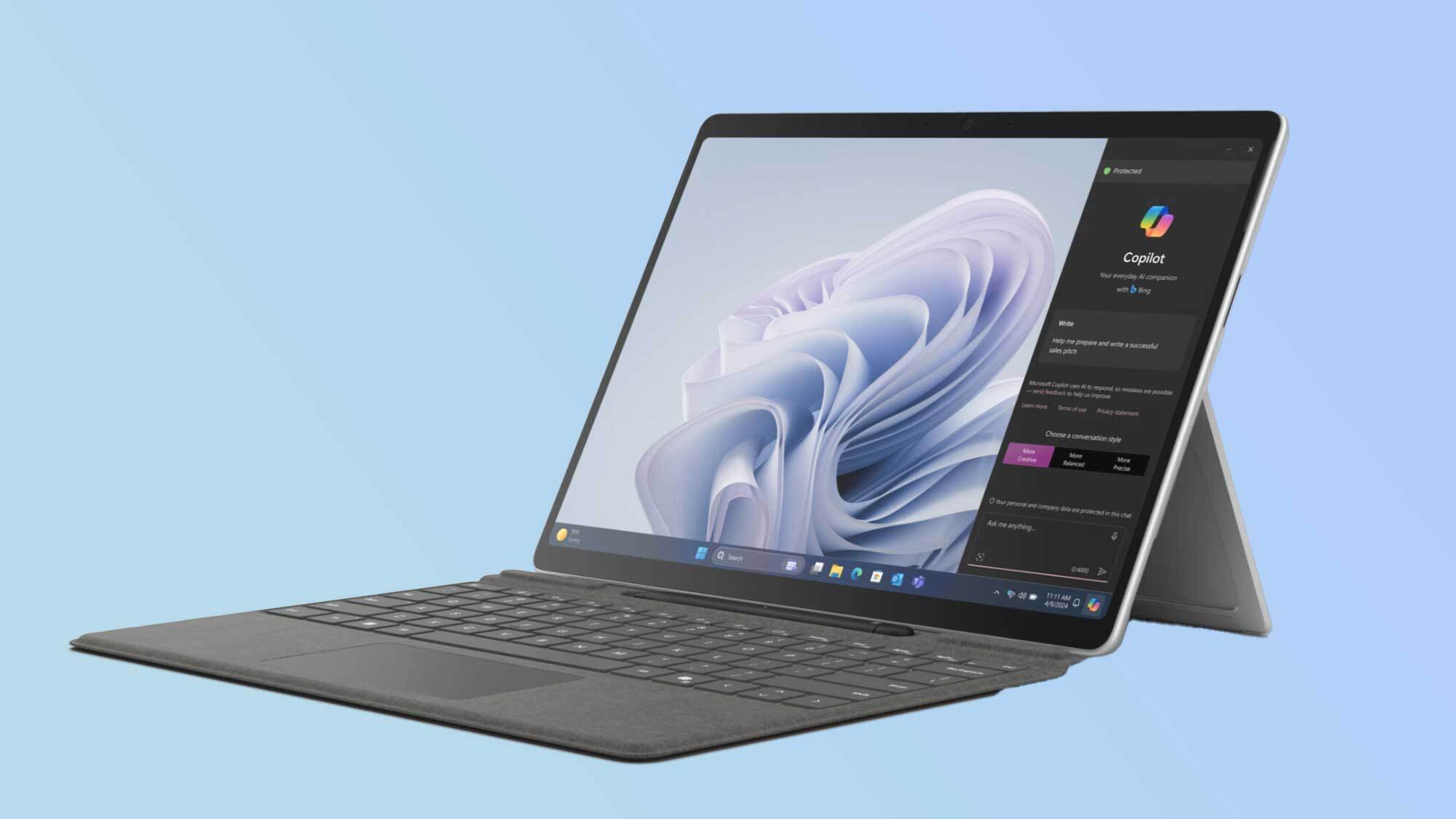
The Surface Pro 10 can also be ordered with a few Microsoft accessories that make it more versatile and useful. The Surface Slim Pen 2 ($129) is a handy active stylus that sports two buttons and supports 4,096 pressure levels, while the Surface Pro Keyboard ($139) can be quickly attached or detached from the tablet.
The keyboard is flimsier than Apple’s Magic Keyboard Pro and doesn’t have a built-in stand, so you’ll have to rely on the Surface Pro 10’s kickstand for hands-free support. If you plan to order both the stylus and keyboard, you can pay an additional $40 to get a Surface Pro Keyboard with a pen storage slot that lets you charge the pen when not in use.
iPad Pro 2024 vs Microsoft Surface Pro 10: Software
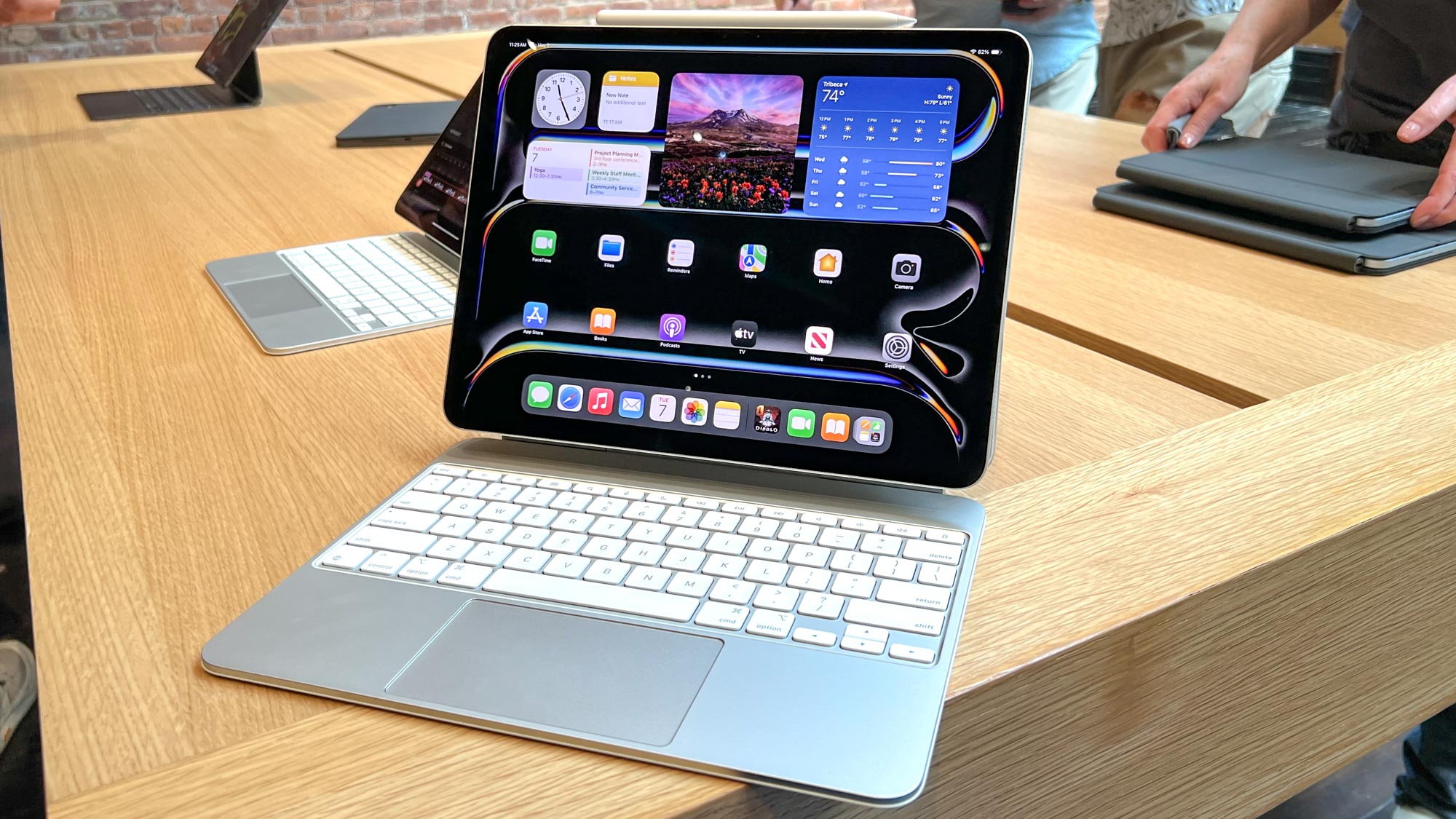
The iPad Pro 2024 runs on iPadOS (which means it will be running iPadOS 18 as soon as it launches) while the Surface Pro 10 runs on your choice of either Windows 11 or Windows 10.
They’re all solid operating systems that will let you make good use of these devices once you learn their ins and outs, but there are some key differences to understand. Apple’s iPadOS is simpler to use and less versatile than Microsoft’s Windows, since Windows was designed to run on desktop PCs while iPadOS was built for tablets.
Windows has gotten a lot more usable on touchscreens over the last decade, but it can still be frustrating to navigate its windows, menus and file structure without a trackpad or keyboard. Once you attach some you’ll find the Surface Pro 10 is about as versatile as the best Windows laptops, since you have all the power of Windows at your fingertips. You can browse the web, download and open files, install programs and apps from any app stores (not just the Microsoft Store), edit file details, write code and more.
You can do a lot of the same things on iPadOS, but not all. While Apple’s iPad operating system is app-based and easy to use, you are limited to using apps from Apple’s App Store. And while there’s a slew of great apps to be had, you simply can’t do as much with them as you can with a full Windows application.
Don’t expect to have an easy time editing file details on your iPad or moving them around, for example, nor can you easily download programs from websites and run them. This helps keep the iPad more secure than any Windows tablet, but it also limits its utility.
iPad Pro 2024 vs Microsoft Surface Pro 10: Outlook
Deciding between the iPad Pro 2024 vs Microsoft Surface Pro 10 can be tricky, but if you’ve read this far I hope you can see how Apple’s slate looks to be fancier, flashier and perhaps more fun, while Microsoft’s is simply more versatile.
Both are slim, light and attractive devices that can be enjoyed recreationally or used for work, though the latter use case is much more attractive if you can afford to kit them out with a nice detachable keyboard that has a trackpad.
But Apple’s latest Pro tablet looks to have the edge when it comes to having fun, as the M4 chip should be able to run any game or app in Apple’s App Store at blazing-fast speeds while the OLED display makes it look great. Plus, the iPad has twice as many speakers as the Surface Pro 10, so it should sound a bit better to boot.
But if you want a tablet for more than kicking back and relaxing, or making music, there’s good reason to consider going with a Surface Pro 10. Despite the current model’s business focus it remains a speedy, good-looking tablet that you can have fun with, and having the full functionality of Windows at your fingertips lets you do a lot more with the Surface than you could with an iPad. If you like the idea of owning a tablet that can double as a work device when you need it, the Surface Pro 10 could easily be a happier fit for you than even the fanciest iPad Pro.

